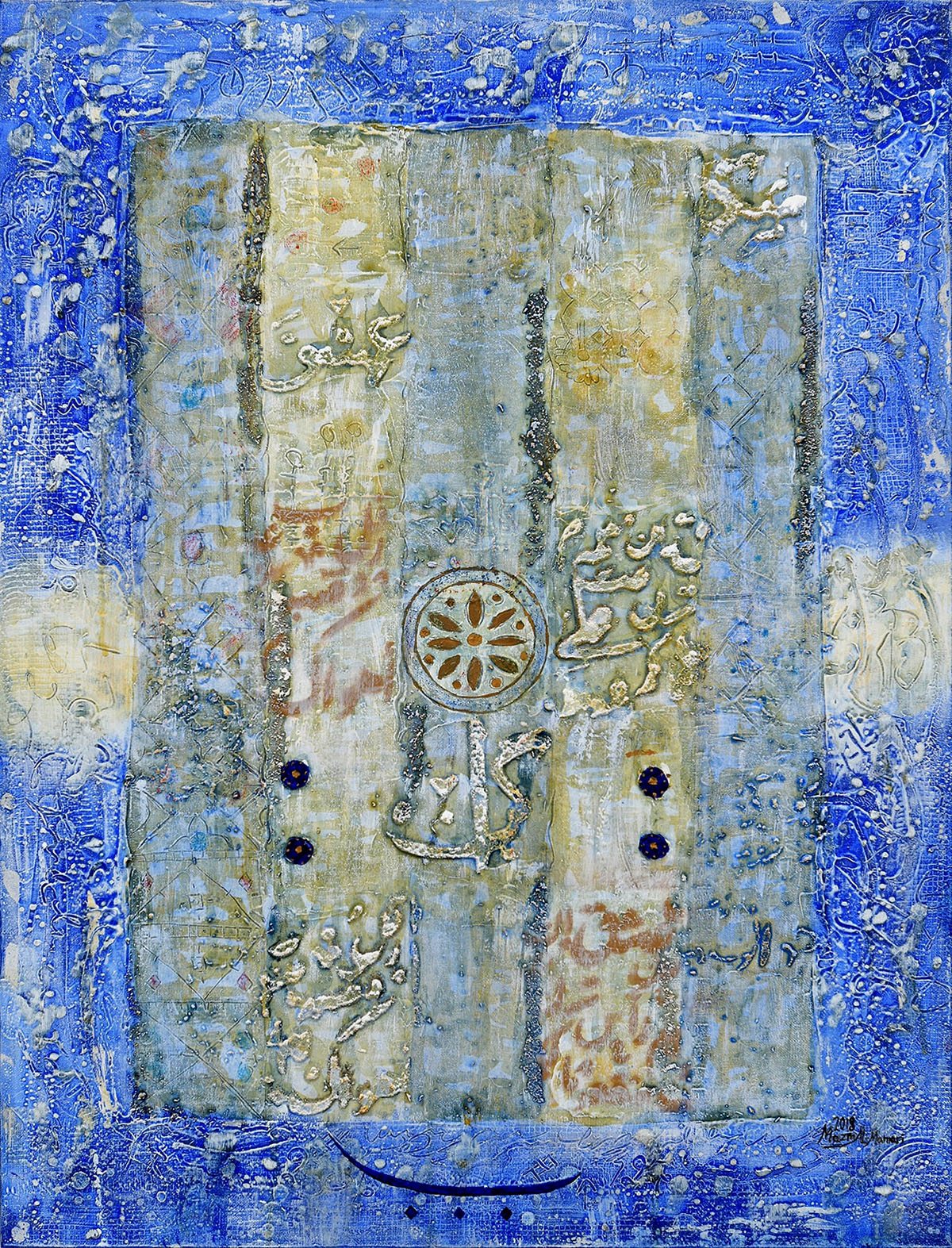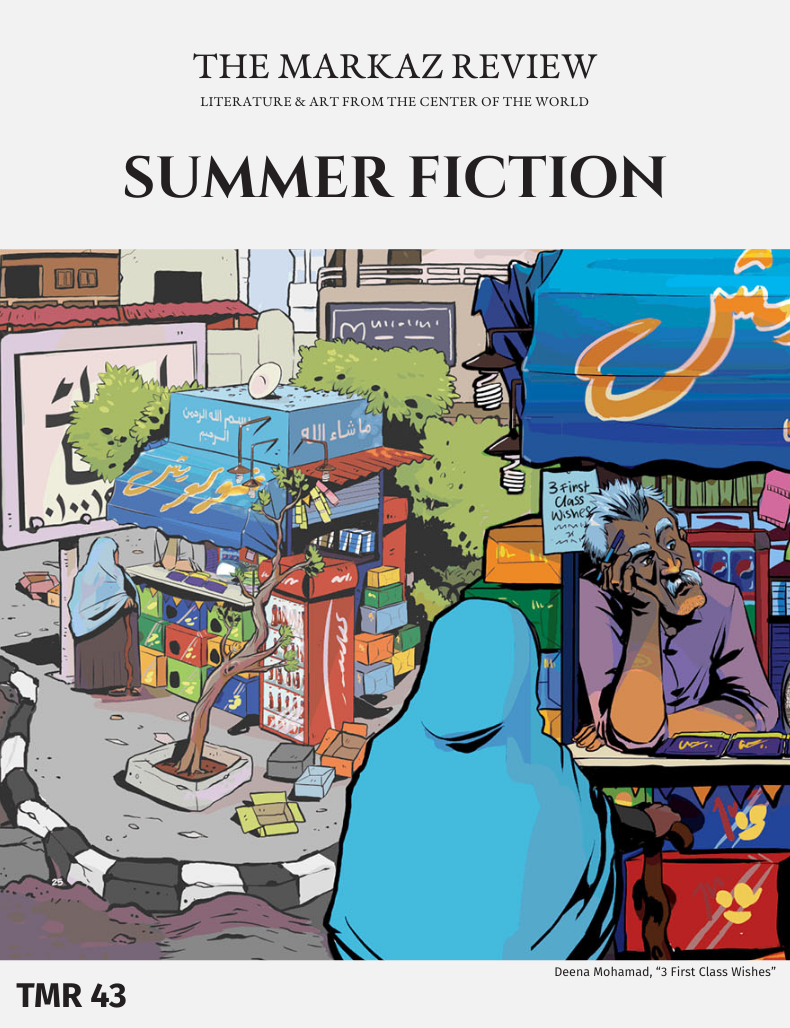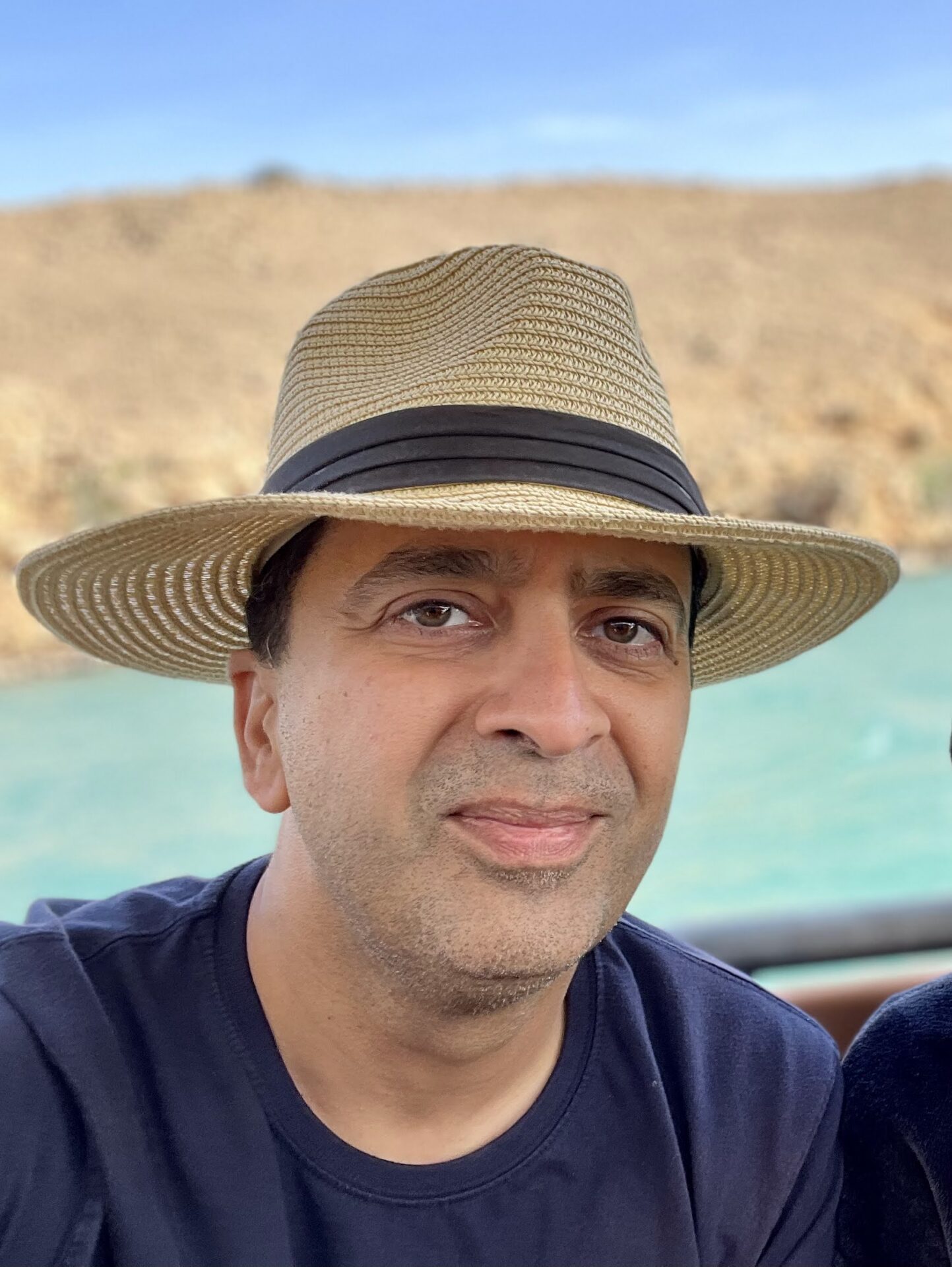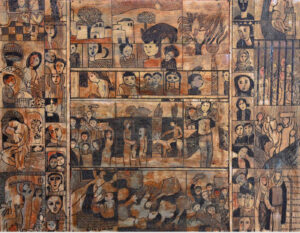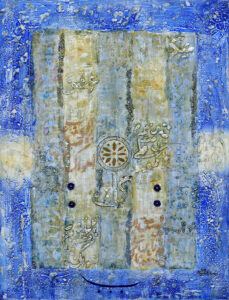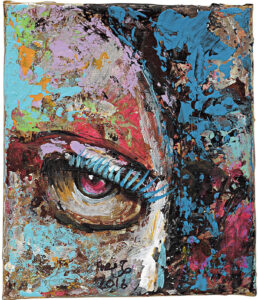What does one really see? A blind grandfather peers into the darkest reaches of his family.
“What do you see behind the door?”
“Another door.”
“And behind that door?”
“A house.”
“What’s in the house?”
“A large tree in a courtyard.”
“What’s beyond the tree?”
“A mountain in the distance.”
“What’s on top of the mountain?”
“A rundown fort.”
“Did the warriors come down from the mountain?”
“I don’t see any warriors.”
“Did they leave their rifles in the dustbins of history?”
“I don’t see anything.”
“What’s behind the fort?”
“A cannon.”
“And then?”
“Then everything stops. I don’t see anything. Nobody can see that far away.”
“But I didn’t ask you about the entire scene, just what’s behind the door.”
“Not fair! You pulled me in with all these questions.”
“Do you consider questions to be a trap in the game of story and scene? Are you looking for a scene to nourish your limited imagination? No matter. Let’s put all that aside. Let’s rearrange our thoughts, even though I don’t see things clearly, in all their fineness. Or perhaps I don’t see them at all. To be honest, I don’t like things to be arranged or categorized neatly. Here I am, sitting by the mihrab, feeling the light falling on me. For years, I’ve been thinking about light. I sense it’s coming from the east, but I want to confirm with you. You know the directions so well since you go to school now. Me, I’m not so sure. Do you know the path?”
“The path to where, grandfather?”
“Good question. Let’s lay aside the path and your questions for the moment. Let’s start putting things back in order and take a different path to the details of the scene. The wall I’m leaning against is the western side of a tiny mosque I built in 1979. There were no walls then. This place was as open as our souls, immense, surrounded by mountains, with tents made of palm fronds pitched here and there. Electricity hadn’t arrived then. My children and I used to pray here. Then, things got scattered. Time and childhood flew by. Some of them traveled overseas, while others went to war, never to return. The walls grew and became houses, which in turn begat more walls and more secrets. The windows of childhood closed prematurely. I got a room, with a small farm on the south side and an electricity connection. I first felt the breeze from an electric fan in 1989, but I never saw the lights come on. Dear child, the blind are a forgotten footnote in the manuscript of the sighted and their haste, a crutch abandoned in darkness.”
“But grandfather, what does this wall have to do with that door and the trap of questions?”
“In order to understand the beginnings of things, you must create their memory and history. So let’s rearrange the scene again: what’s in front of you? Give me details.”
“A white door, open.”
“What’s behind the open white door?”
“Another door, green, made of iron.”
“And what’s behind the green iron door?”
“A white house, with a blue water tanker parked beside it.”
“What do you see on the white house’s wall?”
“A black line, running down from the gutter to a little bicycle.”
“That line is a deep sadness in the house, burrowing into the souls and hearts of its people.”
“How do you know, grandfather?”
“The blind are more perceptive than you, child. Put aside your questions. Let’s restore the story. Remember that haste spoils the pleasure of speech. Must we target the story’s fragile body with these arrow-like questions? In which case, there’s nothing to narrate. You’re just restoring the details of a blurry scene that you don’t see in your memory, trying to grasp the roots of questions to create fragile and scattered tales. Questions are pillars holding up the story and clinging to the roots of speech. You see things in front of you, whereas I brew their history in my memory. There’s no story without history, no history without perception, no perception without pain. Only the blind, women and madmen can truly grasp stories and their roots.”
“Grandfather, you see faraway things even though you’re blind. Sorry, but I can only see what’s in front of me. Or what I can imagine.”
“Very well. Let’s go back to the house then, specifically, to the wall. What do you see on the wall?”
“Like I said, a black line descending from above.”
“It makes no difference if the line is descending from above or rising from below. In either case, it indicates the house’s sorrow. If it’s descending, then sorrow is eating away at the house’s roots. But if it’s ascending, then sorrow is extending into the house’s spaces and eras.”
“Can walls be sad, grandfather?”
“All things have their sadness or joy, provided someone listens to them, ponders their pain without rushing or intruding upon them, without begging. For things reveal their memories, emotions and madness to those who befriend them, those who’re skilled at reading their shadows. My child, things are like a mother’s tender heart, or like the kindness of a dying grandmother.”
“How do you sense the sadness of things if you’re blind, grandfather? How can you read shadows when you can’t see?”
“It’s true that I can’t see, but I can feel. Even time—which you don’t feel—I feel its sadness, its sheer joy at dawn. I feel the silence of things at midnight.”
“But how do you feel, grandfather?”
“Dear child, don’t ask a blind man how he can penetrate the depth of things with his soul, for he has a sense of perception that the sighted cannot comprehend. Don’t ask mountains about their magnificence and loneliness, don’t ask widows about their sorrow, don’t ask birds about their joy in the spring, for everything ultimately reveals its essence without being asked.”
“Why do you say the wall of the white house is sad? Maybe that black line is happy kohl in its eyes.”
“Child, whenever you see blackness on a white wall, think about the sadness of the people in that house.”
“But can’t houses have both sadness and joy, grandfather, all mixed up together?”
“You’re right, my child. Now, what’s that blue water tanker doing by the house? Are people thirsty? Has the well I dug in the early seventies gone dry?”
“Grandfather, why does a blue water tanker mean people are thirsty? Are you making things up or telling me what’s really going on? Is a black line on a white wall really sadness? What if another car was parked outside instead of the blue water tanker? What would that have to do with a well you dug a long time ago?”
“Never you mind. Children are always bored or in a rush, unable to comprehend the essence of things. Maybe you’ll understand the game of possibilities in our story. Don’t rush into this game without the safety rope of possibilities, so as not to fall into the pit of certainty or the trap of reality.”
“I don’t understand what you’re saying. But I do see a blue water tanker parked outside by the white wall.”
“Let’s leave the tanker where it is. Now, there are certain items that drivers usually leave on the dashboard. Can you go fetch them?”
“Do you need these items for your story, grandfather? Is it a game in your imagination?”
“Dear child, stories need roots and small, marginal details. Details are like salt. Without them you can’t taste a story’s flavor.”
The moment the child went out the white door to run over to the blue water tanker, tears rolled down from the blind man’s eyes into his white beard. He reached up and felt the wetness.
The tears had disappeared in the whiteness of time and the dark of memories. Memories flooded over the man, who knew the things and places the child had asked about. Paths, journeys, famines, mountains, stories and years of drought passed through the blind man’s life as wars raged and tribes skirmished. Before the man’s recollection had extended too far into the distant past, the child returned with a sheaf of papers and a blue notebook. He sat down once again at his blind grandfather’s side.
When the child opened the blue notebook, wrinkled pages, old electricity bills and a blue pen fell out. The blind man started at the sound. The child picked up a piece of paper and read aloud some unfamiliar names and numbers.
Nasser bin Abdullah, 15 riyals. Salem bin Mohammed, 20 riyals. Al-Sharqi Sons, 10. Malabari Restaurant, 10.
The blind man became impatient. He said to the child, “Look through the notebook. Water sellers keep their secrets in their notebooks, before they disappear into oblivion.”
The child flipped through the blue notebook, pausing occasionally to read more names and numbers. Somewhere in the middle, he saw a letter written in spidery handwriting. He tried to spell out the words. The grandfather remained silent, listening to the child as he struggled through the text.
Dear father and mother, I want to send you this letter although I’ve never written a letter to anyone in my life before. Even when the Arabic teacher asked us in class to write a letter to a friend, I wrote about friendship instead. He got angry and punished me by making me write it out five times. I didn’t write a love letter, or a goodbye letter, or a letter to the government to ask for something. I don’t like to ask the government for anything, although our government loves those who ask for things. So that’s why I’ve never written a letter in my life.
Roads take people to their homes and destinations, and I’m writing to you while standing by the side of a road, burning with loss and longing for you. I’m trying very hard to make sure people don’t see my tears. I miss you both very much. Mother, I miss your voice at dawn. Father, I miss you at morning prayer before your coffee. I don’t know what the point of life is without you. Everything seems gray when your loss is piercing my soul. All things wither in your absence. Even the tree in the courtyard of our house is lifeless. I miss you so much.
The blind grandfather tried to hide his tears from the child, who didn’t understand the reason for tears, or his grandfather’s relationship to the letter and the water tanker. Silence swaddled the space. The child looked at the tears falling on his grandfather’s white beard, trying to figure out why he was crying. He was afraid to ask and make his grandfather cry even more. He thought of asking him about the doors again.
“Grandfather, why are these doors open toward the white house? Why is the second door green? Have you told the entire story now?”
The grandfather stroked his beard for a while, feeling its moisture. Then he said: “Loss and sadness can’t reconstruct a story, my child. Rather, they break the story apart and fray its connections. The doors are open so you can see how time’s arrows tear things apart. As for the second door’s greenness, you should be grateful that it soothes the savagery of cement.”
After he’d stopped crying by the blue water tanker, the man who’d written a letter to his dead parents in their white house came inside the mosque. He prayed in silence, while his blind grandfather and the child stood behind him.
Shadows of the Story
A tree rooted to the foot of a nearby mountain listened sadly to the conversation between the child and his blind grandfather, not understanding the full story, grieving at the grandfather’s tears and sorrow. It had known the grandfather since it had been a sapling, seen him walking the paths at dawn, heard his tales around the warmth of winter stoves. To reconstruct the story of the blind man and his grandchild, it called out to the large tree in the courtyard of the white house, the same tree the grandfather had asked about earlier.
“Dear tree, guarding the house’s joy and sorrows, why did the grandfather cry so much, as if he were a child?”
“Ah, distant tree, guardian of the dawn, friend of afternoons: every house has its secrets and its wounds. You know the grandfather better than I. You saw him as a youth, whereas I’ve always been bound to this house of cement. But I can tell you this: no man in the twilight of his life should have to see his child depart before him. I understand what happened to the man praying at the mosque. When faced with death, human beings are like children, no matter how old they get. The praying man lost both his parents on one day. Now he feels like he’s lost everything. In his dreams he sees his mother calling him. His eyes, like Jacob’s, have whitened with sorrow.”
Before the man had performed his last prostration in prayer, the house tree fell silent.
The man who’d written a letter that he’d never send emerged from the mosque with his blue notebook.
*The blind grandfather is a recurring figure in Hamoud Saud’s short fictions. “Nafitha Litafoolat Alaa’ma” [“A Blind Window on Childhood”] originally appeared in Al Faisal, a monthly cultural magazine established in 1977.



